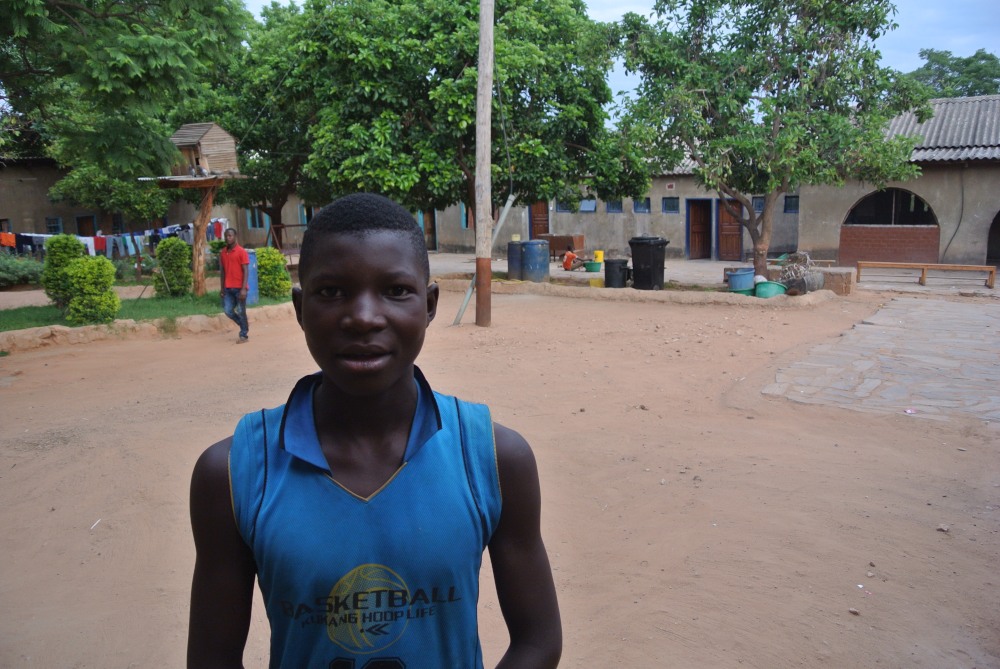Condividere la vita è la radice della gioa cristiana.
Non avrei potuto cominciare meglio il 2016. Il mattino del primo gennaio mi sono svegliato all’alba, e, come sempre quando sono qui a Mthunzi, la casa per ex-bambini di strada di Lusaka (Zambia), sono uscito dalla mia stanza, passato di fronte al piccolo appartamento dove vive con la famiglia il nostro educatore Chakwe, e mi sono affacciato sul cortile, per respirare l’aria di casa. Tutt’intorno ci sono i dormitori, il refettorio, il vecchio deposito di granaglie adattato a salone per gli incontri. Tutti locali molto dimessi e poveramente arredati. Il grande cortile – con la maestosa jacaranda che quando fiorisce in settembre fa sfigurare la bellezza del cielo, e le generose piante di avocado che in questi giorni ci nutrono – ha ospitato dal 1982, quando siamo venuti ad abitare qui, celebrazioni natalizie e pasquali, funerali e matrimoni, battesimi e competizioni di danze tradizionali. Per me è un album dei ricordi. Ogni pianta, ogni siepe, ogni muro mi parla, mi ricorda le persone che c’erano quel giorno quando le abbiamo messe a dimora, quando abbiamo trasformato il locale del mulino in biblioteca, aggiustata quella porta, costruito quel muro. Anche i ragazzi adesso si svegliano. Alcuni per il caldo hanno messo il materasso per terra, all’aperto. Appena mi vedono vengono a salutarmi, riportandomi al presente. Camminando, correndo, saltellando come fanno i più piccoli, alcuni ancora insonnoliti. Tutti, quasi cinquanta che sono, vogliono abbracciarmi e augurarmi un anno felice.
Ci eravamo dati la buonanotte solo quattro ore prima, quando eravamo già nel nuovo anno. Lo avevamo aspettato dopo aver celebrato un messa di ringraziamento, condiviso una semplice cena con tanta polenta, tanti fagioli e una salsiccia a testa. Poi loro hanno cantato, battuti i tamburi e ballato fin quasi a mezzanotte, quando abbiamo festeggiato con biscotti secchi e succo di frutta.
Stanno finendo di salutarmi quando arriva Mama Edina, la cuoca, e le corrono incontro, e subito Edina assegna le incombenze per il mattino, chi prepara la colazione festiva di riso bollito e zuccherato, chi lava i piatti usati ieri sera, chi pulisce i dormitori e poi tutti a mettersi la maglietta più pulita e più bella per avviarsi alla messa nella chiesetta della parrocchia ad un chilometro da qui. Arriva Chakwe che mi si metta a fianco e mi dice “Mai percepito la felicità dei ragazzi come nella Messa, la cena, le danze di ieri sera. E’ stato un unico ininterrotto momento di gioa. Questi ragazzi sono veramente una bella comunità”. Poi aggiunge “Dopo cena ho chiesto a Matthew cosa lo rendesse cosi visibilmente felice, e lui mi ha risposto: perché qui ci vogliamo bene. Vorrei fossero qui quelli che ieri sera si sono istupiditi di birra in un pub, tra loro anche i miei cugini. e capissero che nella vita ci sono cose più belle. A volte con loro preferisco far silenzio, perché se tento di spiegare la gioia del Natale e di Capodanno come li viviamo a Mhunzi, i loro sguardi di sufficienza mi farebbero morire le parole in gola. Quant’è difficile comunicare le cose belle, e il benessere del cuore”.
E sempre difficile comunicare le cose vere e semplici: troppo facile scadere nel dolciastro e nel banale, suscitando sorrisini di compassione. Ma non dobbiamo stancarci di farlo, anche se non siamo i comunicatori ed i poeti che vorremmo essere e che sarebbe necessario essere per riuscire a comunicare il bene. Facciamo quel che possiamo.
E’ molto più facile comunicare il male, spronare al male. E’ cosi ovunque, in ogni comunità umana. Anche qui, nel clima idillico di Kivuli, i bambini a volte manifestano prepotenza, sopraffazione, astute strategie per dividere e dominare. Mi è venuto in mente che in Italia le persone che sanno risvegliare le peggiori reazioni atavicamente egoistiche si dice sappiano “comunicare alla pancia della gente”. La pancia è una parte nobile del corpo che non merita di essere associata al peggior egoismo. Essa ci segnala la fame, che si ci sprona alla ricerca del cibo, ma per l’uomo la fame è anche cibo da condividere, e Gesù usa la fame per descrivere il forte desiderio di giustizia. Addirittura nella tradizione cristiana si parla di “viscere di misericordia”. Non mi pare ci sia nessuna parte del corpo umano – tutto nobile – che si possa usare come metafora di una comunicazione negativa. Allora ho chiesto a Matthew (un sedicenne che aveva iniziato il 2015 in strada, dove era stato costretto a mendicare dal padre alcolizzato) a chi o che cosa paragonerebbe le persone che seminano odio e quelli che li ascoltano. Mi ha risposto sicuro: “sono serpenti che parlano al serpente che è in noi”. Sapienza antica.



Grazie grazie Kizito e a tutta la tua comunità! Nel 2004 sono stato a Kivuli con un gruppo di amici di Ferrara e di quella esperienza porto ancora un ricordo vivissimo!
The message is so profound,meaningful and relevant. Your works in Africa has inspired many including me. May you live to serve humanity and unite the broken hearted.
Nice Father God Will Pay You.
Thank you Francis. Each one of us must do a small part. .
Grazie e torna se e quando puoi! Gli amici sono preziosi.
Michael, I am so happy you read what I write! A great embrace.
Grazie Kizito, sei sempre nel nostro cuore e abbiamo bisogno di te per riportarci alle cose vere, per sfuggire ai condizionamenti di questo nostro mondo, vecchio, impaurito, prigioniero delle proprie sicurezze… Grazie, continua a regalarci speranza nell’umanità.
Rosanna